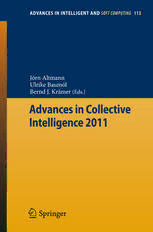Table Of ContentAdvances in Intelligent and
Soft Computing 113
Editor-in-Chief:J.Kacprzyk
Advancesin Intelligentand Soft Computing
Editor-in-Chief
Prof.JanuszKacprzyk
SystemsResearchInstitute
PolishAcademyofSciences
ul.Newelska6
01-447Warsaw
Poland
E-mail:[email protected]
Furthervolumesofthisseriescanbefoundonourhomepage:springer.com
Vol.98.Z.S.Hippe,J.L.Kulikowski,and Vol.106.D.JinandS.Lin(Eds.)
T.Mroczek(Eds.) AdvancesinComputerScience,
Human–ComputerSystemsInteraction: IntelligentSystemandEnvironment,2011
BackgroundsandApplications2,2011 ISBN978-3-642-23752-2
ISBN978-3-642-23186-5
Vol.107.P.Melo-Pinto,P.Couto,C.Serôdio,
Vol.99.Z.S.Hippe,J.L.Kulikowski,and J.Fodor,andB.DeBaets(Eds.)
T.Mroczek(Eds.) Eurofuse2011,2011
Human–ComputerSystemsInteraction: ISBN978-3-642-24000-3
BackgroundsandApplications2,2011
Vol.108.Y.Wang(Ed.)
ISBN978-3-642-23171-1
EducationandEducationalTechnology,2011
Vol.100.S.Li,X.Wang,Y.Okazaki,J.Kawabe, ISBN978-3-642-24774-3
T.Murofushi,andLiGuan(Eds.)
NonlinearMathematicsforUncertaintyand Vol.109.Y.Wang(Ed.)
itsApplications,2011 EducationManagement,EducationTheory
andEducationApplication,2011
ISBN978-3-642-22832-2
ISBN978-3-642-24771-2
Vol.101.D.Dicheva,Z.Markov,
andE.Stefanova(Eds.) Vol.110.L.Jiang(Ed.)
ThirdInternationalConferenceonSoftware, Proceedingsofthe2011InternationalConference
ServicesandSemanticTechnologies onInformatics,Cybernetics,andComputer
S3T2011,2011 Engineering(ICCE2011)November19–20,2011,
Melbourne,Australia,2011
ISBN978-3-642-23162-9
ISBN978-3-642-25184-9
Vol.102.R.S.Choras´(Ed.)
ImageProcessingandCommunications Vol.111.L.Jiang(Ed.)
Challenges3,2011 Proceedingsofthe2011InternationalConference
onInformatics,Cybernetics,andComputer
ISBN978-3-642-23153-7
Engineering(ICCE2011)November19–20,2011,
Vol.103.T.Czachórski,S.Kozielski,and Melbourne,Australia,2011
U.Stan´czyk(Eds.) ISBN978-3-642-25187-0
Man-MachineInteractions2,2011
Vol.112.L.Jiang(Ed.)
ISBN978-3-642-23168-1
Proceedingsofthe2011InternationalConference
Vol.104.D.JinandS.Lin(Eds.) onInformatics,Cybernetics,andComputer
AdvancesinComputerScience, Engineering(ICCE2011)November19–20,2011,
IntelligentSystemandEnvironment,2011 Melbourne,Australia,2011
ISBN978-3-642-23776-8 ISBN978-3-642-25193-1
Vol.105.D.JinandS.Lin(Eds.) Vol.113.J.Altmann,U.Baumöl,
AdvancesinComputerScience, andB.J.Krämer(Eds.)
IntelligentSystemandEnvironment,2011 AdvancesinCollectiveIntelligence2011,2012
ISBN978-3-642-23755-3 ISBN978-3-642-25320-1
Jörn Altmann, Ulrike Baumöl,
and Bernd J. Krämer (Eds.)
Advances in Collective
Intelligence 2011
ABC
Editors
Prof.Dr.JörnAltmann Prof.Dr.BerndJ.Krämer
SeoulNationalUniversity FernUniversitätinHagen
CollegeofEngineering
FakultätfürMathematikundInformatik
DepartmentofIndustrialEngineering
LehrstuhlfürDatenverarbeitungstechnik
599Gwanak-Ro,Gwanak-Gu
Seoul151-742 Universitätsstrasse27
SouthKorea 58097Hagen
E-mail:[email protected] Germany
E-mail:[email protected]
Prof.Dr.UlrikeBaumöl
FernUniversitätinHagen
FakultätfürWirtschaftswissenschaft
LehrstuhlfürBetriebswirtschaftslehre,
insb.Informationsmanagement
Universitätsstrasse41
58097Hagen
Germany
E-mail:[email protected]
ISBN978-3-642-25320-1 e-ISBN978-3-642-25321-8
DOI 10.1007/978-3-642-25321-8
AdvancesinIntelligentandSoftComputing ISSN1867-5662
LibraryofCongressControlNumber:2011940960
(cid:2)c 2012Springer-VerlagBerlinHeidelberg
This work is subject to copyright. All rights are reserved, whether the whole or part
of the material is concerned, specifically the rights of translation, reprinting, reuse of
illustrations,recitation,broadcasting,reproductiononmicrofilmorinanyotherway,and
storageindatabanks.Duplicationofthispublicationorpartsthereofispermittedonly
undertheprovisionsoftheGermanCopyrightLawofSeptember9,1965,initscurrent
version,andpermissionforusemustalwaysbeobtainedfromSpringer.Violationsare
liabletoprosecutionundertheGermanCopyrightLaw.
Theuseof general descriptivenames, registered names, trademarks, etc.in thispubli-
cationdoesnotimply,evenintheabsenceofaspecificstatement,thatsuchnamesare
exemptfromtherelevantprotectivelawsandregulationsandthereforefreeforgeneral
use.
TypesetbyScientificPublishingServicesPvt.Ltd.,Chennai,India
Printedonacid-freepaper
543210
springer.com
Preface
Welcome to the proceedingsof the second Symposium on Collective Intelligence
(COLLIN2011),whichwasheldincollaborationwithSDPS2011onJejuIsland,
South Korea. As collectiveintelligence is a truly transdisciplinaryfield of science
withtransformativepotential,itisaperfectenlargementofSDPS’smission.
Collective intelligence has become an attractive subject of interest for both
academiaandindustry.Moreandmoreconferencesandworkshopsdiscusstheim-
pactoftheusers‘motivationtoparticipateinthevaluecreationprocess,theenabling
roleofleading-edgeinformationandcommunicationtechnologiesandtheneedfor
betteralgorithmstodealwiththegrowingamountofshareddata.Thereare many
interestingandchallengingtopicsthatneedtoberesearchedanddiscussedwithre-
specttoknowledgecreation,creativityandinnovationprocessescarriedforwardin
theemergingcommunitiesofpractice.
COLLIN is on the path to become the flagship conference in the areas of col-
lectiveintelligenceandICT-enabledsocialnetworking.Weweredelightedtoagain
receivecontributionsfromdifferentpartsoftheworldincludingAustralia,Europe,
Asia,andtheUnitedStates.Encouragedbythepositiveresponse,weplanCOLLIN
2012tobeheldnextyearendofAugustatFernUniverstita¨tinHagen.
Inordertoguaranteethequalityoftheevent,eachpaperwentthroughadouble-
blindreviewprocess.Thereviewsconcentratedonoriginality,qualityandrelevance
ofthepapertopictothesymposium.Inaddition,weinvitedafewrenownedexperts
in the field to contributeto the successof the symposiumwith outstandingpapers
reporting on their most recent research. Our special thanks go to the authors for
submitting their papers, to the international program committee members, and to
numerousreviewerswhodidanexcellentjobinguaranteeingthatthepapersinthis
volumeareofveryhighquality.
August2011 Jo¨rnAltmann
UlrikeBaumo¨l
BerndJ.Kra¨mer
Organization
On the organization side, we are indebted to the organizational committees of
COLLIN 2011 and SDPS 2011 for their generous,invaluable help and supportin
all aspects of the organization of the COLLIN track. Our special thanks also go
to Alexander Kornrumpf who dedicated considerable time and effort to the final
editingofthisvolume.
Conference andProgram Chairs
Jo¨rnAltmann
SeoulNationalUniversity,Korea
UlrikeBaumo¨l
Fernuniversita¨tinHagen,Germany
BerndKra¨mer
Fernuniversita¨tinHagen,Germany
Program Committee
RajendraAkerkar
Vestlandsforsking-WesternNorwayResearchInstitute,Norway
StuartEvans
CarnegieMellonUniversity,CampusWest,USA
KaiFischbach
Universita¨tzuKo¨ln,Germany
SabineFliess
FernUniversita¨tinHagen,Germany
OliverGassmann
UniversitySt.Gallen,Switzerland
VIII Organization
SandroGeorgi
Universita¨tSt.Gallen,Switzerland
PeterA.Gloor
MITCenterforCollectiveIntelligence,USA
DerekHarter
TexasUniversity,USA
JunseokHwang
SeoulNationalUniversity,South-Korea
RetoHofsta¨tter
Universita¨tSt.Gallen,Switzerland
HenrikIckler
FernUniversita¨tinHagen,Germany
LynnIlon
SeoulNationalUniversity,South-Korea
ReinhardJung
Universita¨tSt.Gallen,Switzerland
KibaeKim
SeoulNationalUniversity,Korea
JanuszKacprzyk
PolishAcademyofSciences,Poland
JanMarcoLeimeister
Universita¨tKassel,Germany
FrankPiller
RWTHAachen,Germany
NicholasRomano
OklahomaStateUniversity,USA
Chen-YuPhillipSheu
UniversityofCaliforniaatIrvine,USA
NaohiroShichijo
WasedaUniversity,Japan
MuratM.Tanik
UniversityofAlabamaatBirmingham,USA
ByungjoonYoo
SeoulNationalUniversity,South-Korea
Contents
EnoughQuestionsforEverybody ................................. 1
PeterMiller
UnderstandingCollectiveIntelligence ............................. 5
SatnamAlag
PredictingAssetValuethroughTwitterBuzz ....................... 23
XueZhang,HaukeFuehres,andPeterA.Gloor
AddingValuewithCollectiveIntelligence–AReferenceFramework
forBusinessModelsforUser-GeneratedContent .................... 35
HenrikIcklerandUlrikeBaumo¨l
CollectiveIntelligenceModel:HowtoDescribeCollectiveIntelligence .. 53
SandroGeorgiandReinhardJung
TheParticipatoryRolesPlaySimulationinaSocialandCollective
LearningContext .............................................. 65
AurelieAurillaBechinaandToneVold
AComplexNetworkAnalysisoftheWeightedGraphoftheWeb2.0
ServiceNetwork ............................................... 79
KibaeKimandJo¨rnAltmann
HowCollectiveIntelligenceRedefinesEducation .................... 91
LynnIlon
OnPresence,CollectivePerformanceandAssumptionsofCausality.... 103
MarkMcGovern
Preservation of Enterprise Engineering Processes by Social
CollaborationSoftware ......................................... 115
DominicHeutelbeck
X Contents
UnivectorFieldMethodBasedMulti-robotNavigationforPursuit
Problem ...................................................... 131
HoangHuuViet,SangHyeokAn,andTaeChoongChung
HarvestingDomain-SpecificDataResourcesforEnhancedAfter-Sales
IntelligenceinCarIndustry...................................... 145
JanWerrmann
Enough Questions for Everybody
PeterMiller
While I was writing my book, The Smart Swarm, about collective intelligence in
nature and society, I often felt like one of the bees depicted on the front cover,
buzzing from one field of research to another to pick up the latest thinking. As I
workedmywaythroughthewidespreadandexpandinglandscape,Imetbiologists,
physicists, computerscientists, sociologists, engineers,psychologists,economists,
politicalscientists,networktheorists,andneuroscientists,andIbegantoseebroad
connections between the problems they were tackling. Biologists were talking
aboutself-organizationinsuperorganisms,whileeconomistsweredebatingtheself-
correctingtendenciesofmarkets.Physicistsweremodelingcollectivemotion,while
psychologists were measuring collective biases in decision-making. Sociologists
were exploring the wisdom of crowds, while engineers were experimenting with
smartteamsofrobots.Runningthroughallthesediscussionswasacommonthread
thatseemedobviouseventoanon-scientistlikeme:Groupsinnaturehaveevolved
waystosqueezeintelligencefromrelativelysimpleingredients,andifwecouldjust
figureouthowtheydoitwemightlearnsomethinguseful.
As many of you already know, colonies of ants, honeybees, and termites – as
wellasflocksofbirds,schoolsoffish,herdsoflandanimals–coordinatetheefforts
ofthousandsorevenmillionsofindividualsto accomplishfeatsthatnoneof their
memberscanhandlealone,suchasmovingheavyobjects,buildingelaboratenests,
locating the best sources of food, or following migration routes. As they pick up
informationfromoneanotherandrespondappropriately,membersofagroupform
huge, mobile sensor nets to alert one another of dangers or opportunities.By fol-
lowing relativelysimple rulesand constantly interactingwith one another,natural
swarmstakecareofbusinessin atimely,flexiblemanner.Andtheydoso without
bossesthroughvariousformsofself-organization.They’resogoodatit,infact,they
oftenmakebetterdecisionsasgroupsthanwedo,despiteoursuperiorbrainpower.
Because of their appeal as models of collective intelligence, ant colonies and
othergroupsinnaturehaveattractedtheattentionofresearchersinmanydisciplines.
PeterMiller
NationalGeographicMagazine
J.Altmannetal.(Eds.):AdvancesinCollectiveIntelligence2011,AISC113,pp.1–3.
springerlink.com (cid:2)c Springer-VerlagBerlinHeidelberg2012

